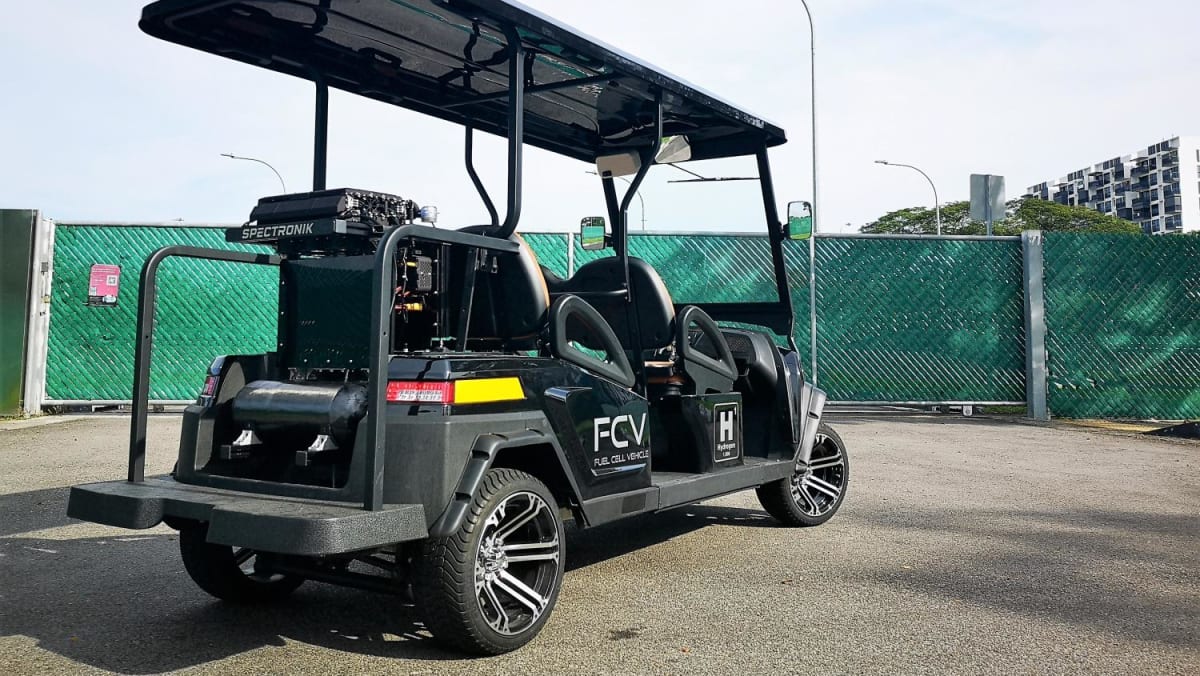[ad_1]
But not all hydrogen is the same. Most of what is provided today is grey hydrogen.
Grey hydrogen releases greenhouse gas emissions, while blue hydrogen is cleaner because its carbon is captured.
To achieve net zero, the aim is green hydrogen. This is hydrogen produced by splitting water by electrolysis. This produces only hydrogen and oxygen.
The challenge is to come up with a scaleable and cost-effective solution.
The majority of hydrogen stations worldwide charge around US$15 to US$20 per kilogramme of grey hydrogen.
Green hydrogen costs more – but that’s what is needed to achieve net zero emissions.
Looking ahead, Spectronik believes that tomorrow’s urban transport demands will diverge between batteries for passenger cars and fuel cells for fleet vehicles – which are groups of motor vehicles owned or leased by businesses, rather than by individuals or families.
It comes down to some key differences between fuel cells and batteries.
According to Mr Jogjaman, fleet vehicles typically return to a centralised depot. This means it is possible and viable to set up one hydrogen station to serve a critical mass of vehicles. This is hence a solution to one of the challenges of not having a nationwide hydrogen infrastructure.
Fleet vehicles are also highly utilised, travelling long distances in a day. They need to be on the road, and time spent charging batteries should ideally be minimised.
Private vehicles do not face such issues. They can be charged when their owners are at work, or asleep.
In addition, while fleet vehicles make up a small portion of the entire vehicle population, they emit a disproportionately large amount of carbon emissions.
[ad_2]
But not all hydrogen is the same. Most of what is provided today is grey hydrogen.
Grey hydrogen releases greenhouse gas emissions, while blue hydrogen is cleaner because its carbon is captured.
To achieve net zero, the aim is green hydrogen. This is hydrogen produced by splitting water by electrolysis. This produces only hydrogen and oxygen.
The challenge is to come up with a scaleable and cost-effective solution.
The majority of hydrogen stations worldwide charge around US$15 to US$20 per kilogramme of grey hydrogen.
Green hydrogen costs more – but that’s what is needed to achieve net zero emissions.
Looking ahead, Spectronik believes that tomorrow’s urban transport demands will diverge between batteries for passenger cars and fuel cells for fleet vehicles – which are groups of motor vehicles owned or leased by businesses, rather than by individuals or families.
It comes down to some key differences between fuel cells and batteries.
According to Mr Jogjaman, fleet vehicles typically return to a centralised depot. This means it is possible and viable to set up one hydrogen station to serve a critical mass of vehicles. This is hence a solution to one of the challenges of not having a nationwide hydrogen infrastructure.
Fleet vehicles are also highly utilised, travelling long distances in a day. They need to be on the road, and time spent charging batteries should ideally be minimised.
Private vehicles do not face such issues. They can be charged when their owners are at work, or asleep.
In addition, while fleet vehicles make up a small portion of the entire vehicle population, they emit a disproportionately large amount of carbon emissions.


Leave a Reply